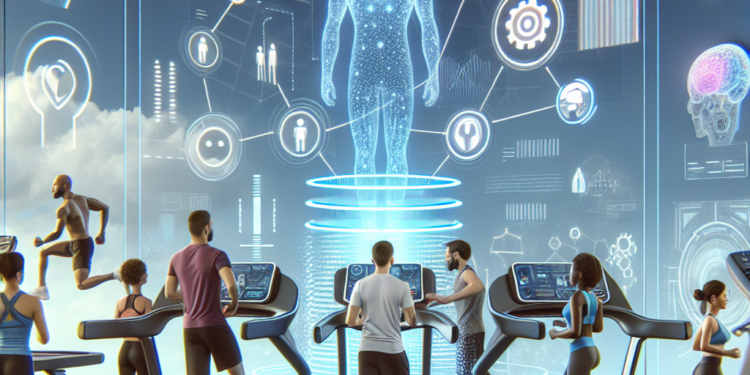Artificial intelligence (AI) has been transforming industries and impacting our lives in various ways. One major industry that has seen significant advancements due to AI is the fitness and wellness industry. AI has made a remarkable impact on how we approach fitness, health, and well-being. From personalized workout plans to virtual coaching and nutrition tracking, AI has revolutionized the way we take care of ourselves. In this article, we will explore some examples of how AI is being used in the fitness and wellness industry.
AI-powered Fitness Apps
There is an increasing number of fitness apps that use AI to provide personalized workout plans and recommendations based on user data. These apps track users’ progress, analyze their fitness goals, and adjust workout routines accordingly. By incorporating AI, these apps can provide more efficient and effective workouts that cater to individual preferences and needs.
One popular example of an AI-powered fitness app is Fitbit. Fitbit uses AI algorithms to track users’ activity levels, heart rate, and sleep patterns to provide personalized health insights and recommendations. The app also offers personalized coaching and encouragement to help users achieve their fitness goals.
Virtual Fitness Coaches
AI-powered virtual coaches are another example of how AI is transforming the fitness industry. These virtual coaches provide personalized guidance, motivation, and feedback to users through virtual interactions. Virtual coaches can help users stay on track with their fitness goals, provide workout recommendations, and give real-time feedback on their form and technique.
One example of a virtual fitness coach is Vi, an AI-powered personal trainer that provides personalized coaching through an app. Vi tracks users’ activity levels, heart rate, and other metrics to create customized workout plans and provide real-time feedback during workouts. By using AI technology, Vi can adapt to users’ needs and preferences, providing a more personalized fitness experience.
Nutrition Tracking and Analysis
AI is also being used to help users track their nutrition intake and make healthier food choices. There are several AI-powered apps and devices that can analyze users’ dietary habits, provide nutritional recommendations, and help users achieve their health goals. These tools use AI algorithms to analyze food data, track calories, and offer personalized meal plans based on individual needs and preferences.
One example of an AI-powered nutrition tracking app is MyFitnessPal. MyFitnessPal uses AI technology to track users’ food intake, analyze nutritional content, and provide personalized meal recommendations. The app also offers features like barcode scanning and recipe suggestions to help users make healthier choices and achieve their fitness goals.
AI-Powered Fitness Devices
AI technology is also being integrated into fitness devices to provide more accurate and personalized tracking of users’ health and fitness metrics. These devices can monitor users’ heart rate, activity levels, sleep patterns, and other health metrics in real-time, providing valuable insights and recommendations to help users improve their overall well-being.
One example of an AI-powered fitness device is the Apple Watch. The Apple Watch uses AI algorithms to track users’ activity levels, heart rate, and sleep patterns, providing personalized health insights and recommendations. The device also offers features like workout tracking, activity reminders, and breathing exercises to help users stay healthy and fit.
Virtual Reality Fitness
Virtual reality (VR) technology is another area where AI is making a significant impact on the fitness industry. VR fitness programs use immersive experiences and AI algorithms to provide users with interactive workout routines and gaming experiences. These programs can make workouts more engaging, motivating, and effective, helping users stay active and achieve their fitness goals.
One example of a VR fitness program is Supernatural, a virtual reality workout app that combines AI technology with immersive experiences to provide users with personalized fitness routines. Supernatural offers a variety of workouts, music, and environments to keep users motivated and engaged during their workouts. By integrating AI technology, Supernatural can track users’ progress, adjust workout intensity, and provide real-time feedback to help users achieve their fitness goals.
Conclusion
AI has brought significant advancements to the fitness and wellness industry, from personalized workout plans to virtual coaching and nutrition tracking. By using AI algorithms and technology, fitness apps, virtual coaches, nutrition tracking apps, fitness devices, and VR fitness programs are able to provide more personalized and efficient solutions for users to improve their health and well-being.
As AI continues to evolve and innovate, we can expect to see even more advancements in the fitness and wellness industry. AI-powered solutions will continue to revolutionize the way we approach fitness, health, and well-being, providing users with more personalized, engaging, and effective tools to help them achieve their fitness goals. Whether you are a fitness enthusiast looking to improve your workouts or someone trying to make healthier choices, AI in the fitness and wellness industry is sure to offer something that suits your needs and preferences.













